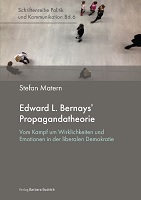Edward L. Bernays’ Propagandatheorie
Vom Kampf um Wirklichkeiten und Emotionen in der liberalen Demokratie
Abstract
Edward L. Bernays gilt als Vater der Public Relations: Bereits in den 1920er Jahren erkannte er das politische Machtpotenzial von Massenmedien in ihrer Einflussnahme auf die öffentliche Meinung und damit die Herausforderungen rund um Desinformation, Propaganda und emotionsgesteuerte Politik, denen sich die liberale Demokratie bis heute ausgesetzt sieht. Stefan Matern nimmt eine erste systematische Auseinandersetzung mit dem Werk Bernays’ aus politiktheoretischer Perspektive vor und beleuchtet mögliche Anknüpfungspunkte für die Politische Theorie. Er zeigt, dass Bernays’ Propagandatheorie mit ihrer interdisziplinären Grundlegung eine spezifische Aktualität besitzt, die in Kombination mit ihrer Anschlussfähigkeit für moderne sozialpsychologische Forschung zeitgenössische Phänomene rund um Fake News, Filterblasen und Echokammern erklären kann. Edward L. Bernays is considered the father of public relations. In the 1920s the nephew of Sigmund Freud drafted a theory of propaganda in which the individual experiences the manipulation of an anthropologically superior elite as an expression of his own desires. The dissolution of the dualism between reason and emotion, as well as the interdisciplinary consideration of the factor "human" illustrate his political-theoretical connectivity and his topicality for phenomena of the digital transformation.


 Download
Download Web Shop
Web Shop